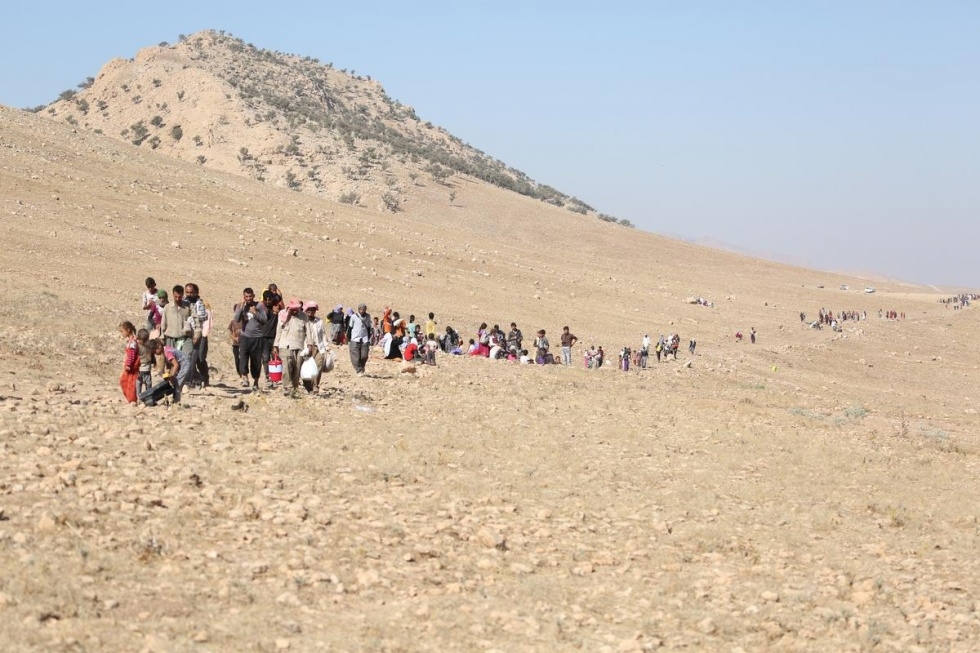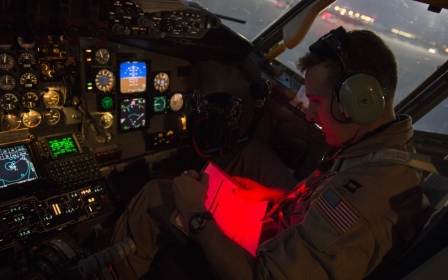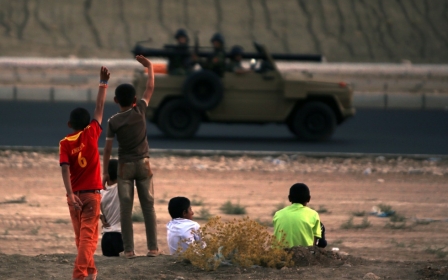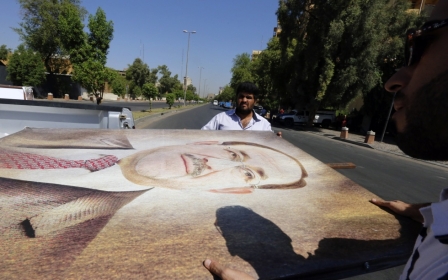US downplays likelihood of evacuation mission atop Mount Sinjar

US special forces found "far fewer" Yazidi refugees atop Mount Sinjar during an assessment than previously thought on Wednesday, making a potentially risky evacuation mission less likely.
Kurdistan officials, however, told The Washington Post on Thursday that the US assessment was "not correct".
"I don't know the exact number, whether it is 10,000 or 15,000 or 5,000, but they are there," said Farhad Atruchi, governor of Kurdistan's Dahuk province, which has received many of the Yazidis.
Atruchi said he believes that many are unable to leave because they are too weak to make the journey off the mountain, and was told on Wednesday to prepare to receive 15,000 Yazidis who the US military were airlifting from the mountain.
The UN has said tens of thousands of civilians, many of them members of the Yazidi religious minority, remain trapped on the mountain after they fled when militants captured the town of Sinjar at the base of the mountain last week.
But following the US assessment mission to the mountain, the Pentagon said late Wednesday that the condition of those on the mountain was better than feared.
"The team has assessed that there are far fewer Yazidis on Mount Sinjar than previously feared, in part because of the success of humanitarian air drops, air strikes on ISIL targets, the efforts of the [Kurdish] Peshmerga and the ability of thousands of Yazidis to evacuate from the mountain each night over the last several days," Pentagon press secretary Rear Admiral John Kirby said.
"The Yazidis who remain are in better condition than previously believed and continue to have access to the food and water that we have dropped," said Kirby.
It was not immediately clear what the impact of the assessment would be on the US mission in Iraq, however, a US deployment on top of the mountain to evacuate civilians would seem unlikely.
On Wednesday, with the arrival of 130 US military advisors in Erbil, the Obama administration said it was studying the possibility of using humanitarian corridors or air lifts to rescue the civilians, raising questions about whether the president's promise to avoid a combat role for US ground troops could be maintained.
“There are dangers involved in any military operation. We absolutely acknowledge that … but [the president] is confident that we can have a limited military objective," National Security Council spokesman Ben Rhodes said.
"We don't believe it's sustainable to just have, you know, permanent air drops to this population on the mountain," he said, referring to the repeated deliveries of food and drinking water dropped by US aircraft this past week.
Rhodes added Obama was going to make a decision "in a matter of days."
UK involvement in a rescue mission also looked "less likely" following Wednesday's assessment, UK International Development Secretary Justine Greening told BBC Breakfast on Thursday.
Greening said the situation on the mountain indicated that US air strikes were working, but Britain would support a rescue mission if neccessary.
Prime Minister David Cameron cut his holiday in Portugal short on Wednesday in order to oversee the government's reponse to the Iraq crisis and chair an emergency Cobra meeting scheduled for 1200 GMT Thursday.
Cameron's return followed criticism from Tory MPs, as well as the Labour Party, earlier this week of the prime minister relaxing while RAF crews were conducting dangerous missions to drop humanitarian supplies for Iraqis stranded on Mount Sinjar.
The US and France are sending weapons to Kurdish forces fighting in northern Iraq.
Analyst: IS won't be defeated with airstrikes
Despite the media attention around the US airstrikes – the first US military activity since the country withdrew troops in 2011 – and pressure on western countries from Kurdish leaders to intervene, analysts say Islamic State will not be defeated with air power in a fight that will likely last years.
While Islamic State uses terror to seize and maintain control of areas on the one hand, on the other, the group has portrayed itself as “the defender of the destitute Sunni community” who feel oppressed under Syrian President Bashar Assad and outgoing Iraqi Prime Minister Nuri al-Maliki, said Fawaz Gerges, professor of international relations at the London School of Economics.
As a result, most of the group’s advances in Iraq have been a result of collaboration between the group’s fighters, former Baathists and tribal groups, Gerges said.
“The great success of IS . . .is its ability to support and rely and call on fighters who don’t really subscribe to its ideology,” Gerges said.
And even if IS is taken on in Iraq, he added, Syria remains IS’ “nerve centre” to which Americans will need to turn their attention if they want to stop the group from expanding.
Some critics of the current airstrikes have raised questions about why the US has chosen to intervene in Iraq at this moment with some focusing on northern Iraq’s oil assets and a CIA station in Erbil as a potential motivator beyond the stranded civilians on Mount Sinjar.
“There have been numerous humanitarian crises brought about by US-sponsored instability in Iraq. We’ve ignored (and/or caused) many of them,” wrote peace activist Dahlia Wasfi in an MEE column this week. “But threats to the oil industry – that danger elicits a militant response from the United States.”
Maliki urged to step aside
The White House on Wednesday urged Iraqi leader Nuri al-Maliki to step aside and allow the man nominated to become his successor as prime minister to form a government.
"He needs to respect that process," Rhodes told reporters. "This is what the Iraqis themselves have decided to do."
President Barack Obama on Monday threw his weight behind the choice of Haidar al-Abadi to form a new government, appealing to Maliki, without directly naming him, to peacefully turn over power.
"The White House will be very glad to see a new government in place with prime minister Abadi at the lead of that government," Rhodes said.
"We believe it's necessary, frankly, to bring the country together," he said, blaming sectarian divisions for a loss of confidence in the government and advances by Sunni militants.
Iraq's top Shiite cleric Grand Ayatollah Ali al-Sistani called for Maliki to be replaced with a more conciliatory figure, according to a letter released on Wednesday.
"I see the need to speed up the selection of a new prime minister," Sistani said in the handwritten letter addressed to leaders of Maliki's Dawa party, which was released by his office more than a month after it was written.
The new premier should be someone who "has broad national acceptance and is able to work together with the political leaders of the other (ethnic and religious) components to save the country from the dangers of terrorism, sectarian war and division," he said.
The call by Sistani, who is revered by millions, will carry enormous weight with the country's Shiite Arab community.
The release of the letter came as Maliki, the incumbent prime minister who has been determined to secure a third term, continued to defy the country's president and international pressure, insisting it would take a federal court ruling for him to quit.
"I confirm that the government will continue and there will not be a replacement for it without a decision from the federal court," Maliki said.
The two-term premier has accused President Fuad Masum of violating the constitution by approving the nomination of Haidar al-Abadi, another Dawa member, instead of him, and vowed to take legal action.
But even before the release of Sistani's letter, analysts said Maliki had lost too much backing to stay in power.
International support has poured in for Abadi, including from both Tehran and Washington, the two main foreign power-brokers in Iraq.
However, overcoming Iraq's problems will not be easy, analysts warn.
"This is not an instant thing - it’s a complex process. It will take a least a year to unify Iraq because there is no trust now," Gerges said.
"What Maliki has done in the last eight years is to deepen the social ideological and sectarian divide and trust is lost," he added.
Meanwhile, the Organisation of Islamic Cooperation (OIC) on Wednesday welcomed the nomination of Abadi as new prime minister of Iraq.
Abadi has won broad international backing, from the United States, Saudi Arabia and Iran amongst other countries.
Maliki said Wednesday it will take a court ruling for him to step down, defying President Masum's decision to task Abadi with forming a government.
New MEE newsletter: Jerusalem Dispatch
Sign up to get the latest insights and analysis on Israel-Palestine, alongside Turkey Unpacked and other MEE newsletters
Middle East Eye delivers independent and unrivalled coverage and analysis of the Middle East, North Africa and beyond. To learn more about republishing this content and the associated fees, please fill out this form. More about MEE can be found here.




